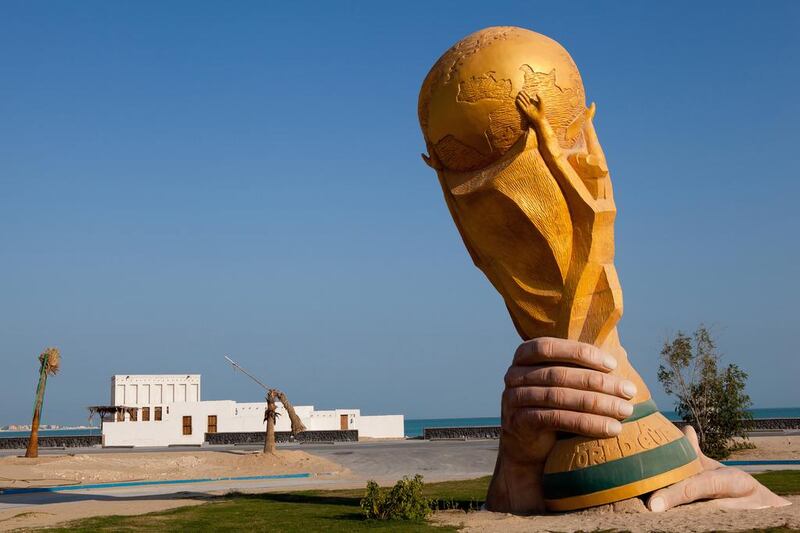with Shereen El Gazzar reporting
In 2010, when Qatar won its bid to host the 2022 Fifa World Cup, the UAE said it was ready to make available its stadiums, hotels and infrastructure if needed in support of its brotherly Gulf state.
“Since our neighbour Qatar was chosen to host the World Cup, we feel UAE will also be a part of the event even though we are not hosting it,” Yousef Mohammed Abdullah, general secretary of the UAE Football Association said at the time.
“It is only 400 kilometres by road to Doha from here. Once they build the bridge [UAE-Qatar causeway], it will be like travelling from Abu Dhabi to Sharjah. Anyway travelling distances are short, unlike in South Africa [during the 2010 Fifa World Cup], where it was 1,000km from Cape Town to Johannesburg.”
The offer of support was indicative of each country’s efforts to cooperate in the future development of the entire Gulf.
Now the biggest regional diplomatic spat in more than a decade over Qatar’s perceived failure to stay out of its neighbours’ internal affairs could undermine numerous planned cooperative economic projects and hamper cross-border investment.
After the withdrawal of the UAE, Saudi and Bahrain envoys from Doha on Wednesday, the cost of insuring against the default of Qatar’s sovereign debt rose nine basis points to 65, according to data compiled by Bloomberg.
Gulf markets also reacted negatively on Wednesday, with stocks listed on the Qatar Exchange experiencing the biggest losses.
Analysts say that it is likely that Qatar will seek to smooth tensions in order not to compromise any economic opportunities.
“These political tensions will be resolved,” said Finbarr Sexton, a partner in tax at Ernst & Young’s Doha office. “There’s already been strong economic integration in the region and the states have been very active over the last 20 years, so I don’t think tensions will impact integration plans.”
The GCC has been working on developing a common market, enabling citizens of the six states to buy stocks and property or gain an education in any of the other member countries.
At the GCC summit held in Kuwait last year, members signed an agreement for a military union, which would trigger further defence spending.
Furthermore, a US$15.4 billion railway project planned for completion in 2018 would ease logistic requirements and boost trade between the member states.
But a customs union remains beset by IT problems to disperse tax receipts. Other plans including a VAT system across the GCC and a proposed single currency have stalled.
Any prolonged dispute could also cast doubt on Qatar investments in the UAE. Home to one of the world’s largest sovereign wealth funds – the Qatar Investment Authority – much of the state’s largest investment flows head to Europe and other parts of the world. But the UAE still benefits from some investment. Qatar had the highest per capita investment in Dubai property last year at Dh6.71 million, according to data released last month by the Dubai Land Department.
There has also been extensive expansion of the region’s aviation capacity with the UAE, Saudi and Qatar in particular investing in new airports and national airlines.
Saif Mohammed Al Suwaidi, director general of the General Civil Aviation Authority said: “So far we haven’t received any instruction from the Government with regard to the UAE and Qatar when it comes to aviation.”
“The operations are normal. Usually in the UAE we try not to mix between political issues and commercial issues.”
Asked if there had been a change in status of any visitors with Qatari residency arriving at airports in the UAE, he said: “No restrictions on residency. No change to the current situation”.
Within the banking sector, there has also been cross-investment, including Qatar National Bank, the country’s biggest bank by assets, in 2012 raising its stake in Dubai-based Commercial Bank International to 39.9 per cent, as it eyed opportunities in the GCC’s biggest banking market. QNB yesterday declined to comment on the potential implications of the political disagreement on its expansion plans.
Equally, several UAE-based companies, including the building contractors
[ Arabtec ]
and
[ Drake & Scull ]
, have ramped up their presence in Qatar in recent years as the country expands its infrastructure ahead of its hosting the 2022 World Cup.
Equities of UAE and Qatari companies are due for inclusion into
[ MSCI ]
’s emerging markets index in May, paving the way for up to US$1 billion of new money from foreign institutional investors.
Vikas Papriwal, a partner in transactions and restructuring at KPMG, the professional services company, said it was still too early to say how international investors would respond to news of the political dispute.
“From an investor view, most gauge an investment by whether it is sustainable in the long to medium term,” he said.
halsayegh@thenational.ae
tarnold@thenational.ae
selgazzar@thenational.ae
Follow us on Twitter
[ @Ind_Insights ]





